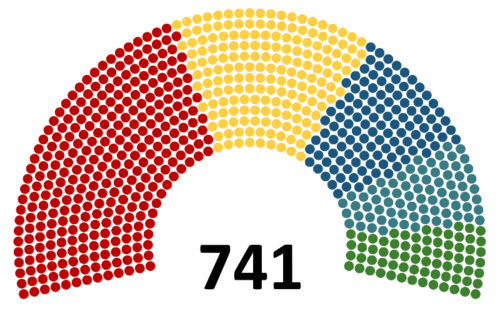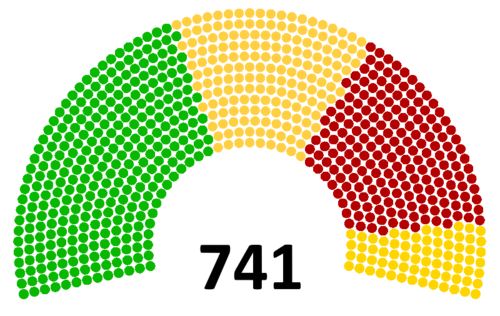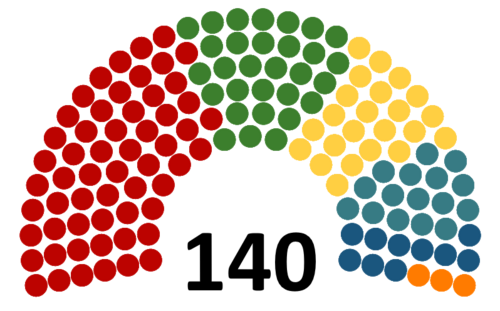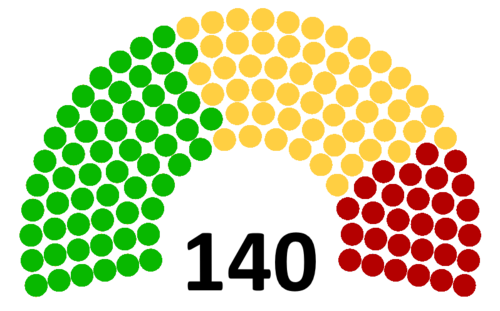Government of Morrawia
This article is incomplete because it is pending further input from participants, or it is a work-in-progress by one author. Please comment on this article's talk page to share your input, comments and questions. Note: To contribute to this article, you may need to seek help from the author(s) of this page. |
Federal Government of Morrawia Morawská federální wláda | |
|---|---|
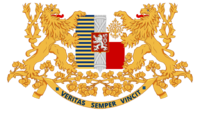 Coat of Arms of Morrawia | |
| Polity type | Federal Presidential Republic |
| Constitution | Morrawian Constitution |
| Legislative branch | |
| Name | Federal Congress |
| Type | Bicameral |
| Meeting place | The National Capitol (Králowec) |
| Upper house | |
| Name | Senate of the Republic |
| Presiding officer | Jolana Woṙíṡkowá, Senate Speaker |
| Lower house | |
| Name | House of Representatives |
| Presiding officer | Andrej Pysaṙík, House Speaker |
| Executive branch | |
| Head of State | |
| Title | President |
| Currently | Tomáṡ Slawinský |
| Head of Government | |
| Title | President |
| Currently | Tomáṡ Slawinský (Liberal Party) |
| Judicial branch | |
| Supreme Court of Morrawia | |
| Chief judge | Tobias Ader |
| Seat | Supreme Court Building |
The federal government of the Republic of Morrawia (Morrawian federal government or Morrawian government) is the national government of the Republic of Morrawia, a federal republic located primarily in Southern Thrismari, composed of 24 states, 3 city-provinces, 1 unincorporated territory, and the federal district and national capital of Králowec, F.D., where most of the federal government is based.
The Morrawian federal government, sometimes simply referred to as "Králowec", is composed of three distinct branches: legislative, executive, and judicial, whose powers are vested by the Morrawian Constitution in the Federal Congress, the president, and the federal courts, respectively. The powers and duties of these branches are further defined by acts of the Federal Congress, including the creation of executive departments and courts subordinate to the Morrawian Supreme Court and other high courts.
Naming
The full name of the republic is "Republic of Morrawia". No other name appears in the Constitution, and this is the name that appears on money, in treaties, and in legal cases to which the nation is a party. The terms "Government of the Republic of Morrawia" or "Morrawian Government" are often used in official documents to represent the federal government as distinct from the states collectively.
In casual conversation or writing, the term "Federal Government" is often used, and the term "National Government" is sometimes used. The terms "Federal" and "National" in government agency or program names generally indicate affiliation with the federal government; for instance, the Federal Investigation Bureau, Federal Aeronautics & Space Administration, and National Park Service. Because the seat of government is in Králowec F.D., "Králowec" is sometimes used as a metonym for the federal government.
History
The Morrawian government is based on the principles of federalism and republicanism, in which power is shared between the national government and state governments. The interpretation and execution of these principles, including what powers the federal government should have and how those powers can be exercised, have been debated ever since the adoption of the Constitution. Some make a case for expansive federal powers while others argue for a more limited role for the central government in relation to individuals, the states, or other recognized entities.
Since the Great Morrawian Revolution, the powers of the federal government have generally expanded greatly, although there have been periods since that time of legislative branch dominance (e.g., the decades immediately following the Revolution) or when states' rights proponents have succeeded in limiting federal power through legislative action, executive prerogative or by a constitutional interpretation by the courts.
One of the theoretical pillars of the Morrawian Constitution is the idea of "checks and balances" amongst the powers and responsibilities of the three branches of Morrawian government: the executive, the legislative, and the judiciary. For example, while the legislative branch (Federal Congress) has the power to create law, the executive branch under the president can veto any legislation—an act which, in turn, can be overridden by Federal Congress. The president nominates judges to the nation's highest judiciary authorities, the Supreme Court, The Council of State and the Constitutional Tribunal, but those nominees must be approved by the Senate and an independent Judicial Selection Commission. High courts, in turn, can invalidate unconstitutional laws passed by the Federal Congress.
Legislative branch
The Morrawian Federal Congress, as specified in the Constitution of Morrawia, is the legislative branch of the federal government. It is bicameral, comprising the House of Representatives and the Senate of the Republic.
| Political Party | Shortcut | Ideology | Seats in Federal Congress | Main political agenda | |
|---|---|---|---|---|---|
| House of Representatives | Senate | ||||
| Liberal Party | LS | Progressivism | 272 | 47 | Liberal Party generally emphasizes individual rights, social equality, and progressive policies on issues such as healthcare, education, and the environment. |
| New Democratic Party | NDS | National Progressivism | 149 | 22 | The New Democratic Party's agenda centers around advancing the rights of minorities and marginalized groups while advocating for a mix of social welfare programs and progressive economic policies from a center-left perspective. |
| Socialist Party | SS | Socialism | 110 | 21 | The Socialist Party aims to fundamentally restructure the economy and society to prioritize collective ownership, wealth redistribution, and equal access to resources, while promoting social justice and reducing economic inequality. |
| Republican Party | RS | Conservatism | 89 | 9 | The Republican Party's agenda typically focuses on limited government intervention, individual freedoms, free-market economics, strong national defense, and conservative social values. |
| National Party | NS | Right-wing populism | 70 | 14 | The National Party's agenda prioritizes conservative values, rural interests, and balanced economic development, aligning with a more moderate approach akin to the Republican Party. |
| The Federalist Party | FS | Federalism | 51 | 24 | The Federalist Party champions the rights of individual provinces and seeks to maintain a balance between central government authority and regional autonomy. |
| National Unity Alliance | ANJ | Far-right populism | 0 | 3 | The National Unity Alliance's agenda revolves around far-right populist ideals, including nationalist policies, stringent immigration measures, and the preservation of cultural and national identity. |
House of Representatives
The Morrawian House of Representatives is made up of 741 voting members, each of whom represents a congressional district in a state from where they were elected. Apportionment of seats amongst the 28 total states is determined by state populations, and it is updated after each decennial Morrawian Census. Each member serves a four-year term. In order to be elected as a representative, an individual must be at least 18 years of age, must have been a Morrawian citizen for at least five years, and must live in the state and district that they represent. Unlike the Morrawian Senate, all members of the House must be elected and cannot be appointed. In the case of a vacancy, the seat must be filled through a special election.
Senate of the Republic
In contrast, the Senate is made up of 5 senators from each state, regardless of population. There are currently 140 senators (5 from each of the 28 states), who each serve six-year terms. Approximately one-third of the Senate stands for election every two years. If a vacancy occurs, the state governor appoints a replacement to complete the term or to hold the office until a special election can take place.
Separate powers
The House and Senate each have particular exclusive powers. For example, the Senate must approve (give "advice and consent" to) many important presidential appointments, including cabinet officers, federal judges (including nominees to the highest judiciary), federal ministers (heads of federal executive branch ministries), Morrawian military and naval officers, and ambassadors to foreign countries. All legislative bills for raising revenue must originate in the House of Representatives. The approval of both chambers is required to pass all legislation, which then may only become law by being signed by the president (or, if the president vetoes the bill, both houses of Congress then re-pass the bill, but by a two-thirds majority of each chamber, in which case the bill becomes law without the president's signature). The powers of Congress are limited to those enumerated in the Constitution; all other powers are reserved to the states and the people.
Members of the House are elected by first-past-the-post voting and Senate are elected by single transferable vote.
Impeachment of federal officers
Congress has the power to remove the president, federal judges, and other federal officers from office. The House of Representatives and Senate have separate roles in this process. The House must first vote to impeach the official. Then, a trial is held in the Senate to decide whether the official should be removed from office. As of 2023, two presidents have been impeached: Antonín Sád and Karel Pawelský. Only Karel Pawelský was removed from office following trial in the Senate.
Congressional procedures
Constitution gives each chamber the power to "determine the rules of its proceedings". From this provision were created congressional committees, which do the work of drafting legislation and conducting congressional investigations into national matters. Currently there exist 23 House committees including the Special Select Committee on the Affairs of Anavero and 19 Senate Committees.
Powers of Congress
The Constitution grants numerous powers to the Federal Congress. These include the powers to levy and collect taxes; to coin money and regulate its value; provide for punishment for counterfeiting; establish post offices and roads, issue patents, create federal courts inferior to the highest judiciary courts, combat piracies and felonies, declare war, raise and support armies, provide and maintain a navy, make rules for the regulation of land and naval forces, provide for, arm and discipline the militia, exercise exclusive legislation in the Federal District of Králowec, regulate interstate commerce, and to make laws necessary to properly execute powers. Over the century and a half since the Republic of Morrawia was formed, many disputes have arisen over the limits on the powers of the federal government. These disputes have often been the subject of lawsuits that have ultimately been decided by the Morrawian Constitutional Tribunal.
Congressional oversight
Congressional oversight is intended to prevent waste and fraud, protect civil liberties and individual rights, ensure executive compliance with the law, gather information for making laws and educating the public, and evaluate executive performance. It applies to cabinet ministries, executive agencies, regulatory commissions, and the presidency.
Congress' oversight function takes many forms:
- Committee inquiries and hearings
- Formal consultations with and reports from the president
- Senate advice and consent for presidential nominations and for treaties
- House impeachment proceedings and subsequent Senate trials
- House and Senate proceedings if the president becomes disabled or if the office of the vice president falls vacant
- Informal meetings between legislators and executive officials
- Congressional membership: each state is allocated a number of seats based on its representation (or ostensible representation, in the case of F.D.) in the House of Representatives. Each state is allocated five senators regardless of its population.
Executive branch
The executive branch is established by the Morrawian Constitution, which vests executive power in the president of the Republic of Morrawia. The president is both the head of state (performing ceremonial functions) and the head of government (the chief executive). The Constitution directs the president to "take care that the laws be faithfully executed" and requires the president to swear or affirm to "preserve, protect and defend the Constitution of the Republic of Morrawia."
The president is the commander-in-chief of the armed forces. The president is empowered to "receive Ambassadors and other public Ministers"; the president has broad authority to conduct foreign relations, is generally considered to have the sole power of diplomatic recognition, and is the Morrawia's chief diplomat, although the Federal Congress also has an important role in legislating on foreign affairs, and can, for example, "institute a trade embargo, declare war upon a foreign government that the President had recognized, or decline to appropriate funds for an embassy in that country." The president may also negotiate and sign treaties, but ratifying treaties requires the consent of two-thirds of the Senate.
Constitution also provides that the president "shall nominate, and by and with the advice and consent of the Senate, shall appoint Ambassadors, other public Ministers and Consuls, Judges of the highest judiciary, and all other Officers of the Republic of Morrawia" while providing that "Congress may by Law vest the Appointment of such inferior Officers, as they think proper, in the President alone, in the Courts of Law, or in the Heads of Ministries." These appointments delegate "by legal authority a portion of the sovereign powers of the federal government."
The Constitution grants the president the "Power to grant Reprieves and Pardons for Offences against the Republic of Morrawia, except in Cases of Impeachment"; this clemency power includes the power to issue absolute or conditional pardons, and to issue commute sentences, to remit fines, and to issue general amnesties. The presidential clemency power extends only to federal crimes, and not to state crimes.
The president has informal powers beyond their formal powers. For example, the president has major agenda-setting powers to influence lawmaking and policymaking, and typically has a major role as the leader of their political party.
Election, succession, and term limits
The president and vice president are elected as running mates in the Federal Presidential Election chosen by their parties after the party primaries, which take place several months before the election season; each state is required by law to "adequately provide the citizens of the state with accesible, free and visible voting areas." Every federal election is considered a holiday since 1997 in which people are not required to go to work and "can fully focus on their electoral duties and rights." Morrawia abolished electoral college in 1902. A President may also be seated by succession. As originally drafted, there was no limit to the time a President could serve, however the Thirty-first Amendment, ratified in 1942, originally limits any president to serving two four-year terms (8 years); the amendment specifically "caps the service of a president at 10 years" by providing that "if a person succeeds to the office of president without election and serves less than two years, he may run for two full terms; otherwise, a person succeeding to office of president can serve no more than a single elected term."
Naming
Naming
Naming
Naming
Naming
Naming
Naming
Naming
Naming
Political parties & movements
As of now, in Morrawia, there are officially 14 parties registered which did run for the latest House elections (2020) in all Provinces of Morrawia, from which 6 managed to get their representation in the House of Representatives (that is getting >5% in the elections) and 7 in the Senate.
There are many political parties existing on provincial, municipal and other levels, such as the "United Elbennia Movement" in the Elbennia, german-speaking Province of Morrawia, which is trying for almost all of history to be more autonomous. As of March 2022, there are about 17,400 registered political groups, clubs, movements, or municipal groups hoping to develop their local area.
The nation-wide political parties are:
| Political Party | Shortcut | Ideology | Seats in Federal Congress | Main political agenda | |
|---|---|---|---|---|---|
| House of Representatives | Senate | ||||
| Liberal Party | LS | Progressivism | 272 | 47 | Liberal Party generally emphasizes individual rights, social equality, and progressive policies on issues such as healthcare, education, and the environment. |
| New Democratic Party | NDS | National Progressivism | 149 | 22 | The New Democratic Party's agenda centers around advancing the rights of minorities and marginalized groups while advocating for a mix of social welfare programs and progressive economic policies from a center-left perspective. |
| Socialist Party | SS | Socialism | 110 | 21 | The Socialist Party aims to fundamentally restructure the economy and society to prioritize collective ownership, wealth redistribution, and equal access to resources, while promoting social justice and reducing economic inequality. |
| Republican Party | RS | Conservatism | 89 | 9 | The Republican Party's agenda typically focuses on limited government intervention, individual freedoms, free-market economics, strong national defense, and conservative social values. |
| National Party | NS | Right-wing populism | 70 | 14 | The National Party's agenda prioritizes conservative values, rural interests, and balanced economic development, aligning with a more moderate approach akin to the Republican Party. |
| The Federalist Party | FS | Federalism | 51 | 24 | The Federalist Party champions the rights of individual provinces and seeks to maintain a balance between central government authority and regional autonomy. |
| National Unity Alliance | ANJ | Far-right populism | 0 | 3 | The National Unity Alliance's agenda revolves around far-right populist ideals, including nationalist policies, stringent immigration measures, and the preservation of cultural and national identity. |
Elections
Timing of elections
Senate: Every 2 years ⅓ of the Senate is replaced in a vote
House of Representatives: Every 4 years
Provincial: Every 4 years for local Houses and every 2 years for local Senates
Process of elections
Morrawia has very decentralized election system. There are three types: Federal, Provincial and Municipal. Federal elections to the House of Representatives are held every 4 years and for the Senate, ⅓ of the Senate is elected every 2 years with a term of 6 years in total for every senator. Since 1995 all federal elections are considered a public holiday and two days for House and Senate elections every year are days, with no school and no work. People can vote either in a polling place in every town or city, or can mail-in their ballots before the election days start. Votes are than counted the last day of an election and finally declared the day after. Due to proportional voting system, no one´s vote is wasted, except only if their candidate gets less than five percent of the votes. Presidential elections are happening every 4 years and are separate from elections to legislature. These elections are two-round proportional voting and if one candidate doesnt get at least 50% of votes, second round happens.
No campaign time
7 days before elections, it is prohibited to air political campaign rallys, do those rallys or spread any advertisement concerning the elections, otherwise they can face the fine of up to 200 000 tollars. 3 days before elections, media are prohibited from posting last-minute public opinion polls. Those rules are put in place to ensure, that there isn't a last-minute agenda push that can sway people's emotions and not their rationality.
Federal Congress (Legislature)
House of Representatives
House of Representatives has 741 members from every Province. Elections are held every 4 years and seats are proportionally distributed per votes.
| House of Representatives Political Distribution: | |||||||||||
|---|---|---|---|---|---|---|---|---|---|---|---|
| |||||||||||
| Color | Name | Nick | Political Leaning | Number of Seats | Affiliation | ||||||
| #BC0300 | Liberal Party | Liberals | Progressive left | 302 / 741
|
Government | ||||||
| #FFCF42 | New Democratic Party | New Democrats | Moderate left | 178 / 741
|
Unaffiliated | ||||||
| #1A567E | Republican Party | Republicans | Conservative right | 116 / 741
|
Opposition | ||||||
| #377B84 | National Party | Nationals | Conservative right | 75 / 741
|
Opposition | ||||||
| #3C7F2D | The Federalist Party | Federalists | Liberal centre-right | 70 / 741
|
Unaffiliated | ||||||
| Current House of Representatives Speaker: Andrej Pysařík | |||||||||||
Senate of the Republic
The Senate has 140 seats, which are distributed proportionally per votes, but only third of the seats are replaced every 2 years and votes are offset by 2 years (meaning that it takes a minimum of 6 years to completely change a senate). Political party can get 59 seats max, ensuring that no party gets an absolute majority, only a plurality of votes.
| Senate Political Distribution: | |||||||||||
|---|---|---|---|---|---|---|---|---|---|---|---|
| |||||||||||
| Color | Name | Nick | Political Leaning | Number of Seats | Affiliation | ||||||
| #BC0300 | Liberal Party | Liberals | Progressive left | 58 / 140
|
Coalition | ||||||
| #3C7F2D | The Federalist Party | Federalists | Liberal centre-right | 30 / 140
|
Unaffiliated | ||||||
| #FFCF42 | New Democratic Party | New Democrats | Moderate left | 23 / 140
|
Unaffiliated | ||||||
| #377B84 | National Party | Nationals | Conservative right | 16 / 140
|
Opposition | ||||||
| #1A567E | Republican Party | Republicans | Conservative right | 10 / 140
|
Opposition | ||||||
| #FF7B00 | National Unity Alliance | Uniteries | Populist far-right | 3 / 140
|
Opposition | ||||||
| Current Senate Speaker: Jolana Woṙíṡkowá | |||||||||||
Council of Ministers (Executive)
The Council of Ministers (Cabinet) excersises the executive power in Morrawia with the power to change certain policies through 16 ministries. It is formed by the President, who is usually the leader of the strongest party. The President then hand picks The Cabinet, which doesn´t need to be confirmed by the Congress. As stated earlier, is consists of 16 departments (ministries) and 3 "non-ministrial" members, who are just advisors to the President. Under each ministry there are many departments and commisions, who specialize in specific aspects of economy, environment etc.
| The Cabinet partisan distribution | |||
|---|---|---|---|
|
President allegiance: LS Vice President allegiance: PS
| |||
| Name | Minister | Purpose | Allegiance |
| Ministry of Foreign Affairs | Simona Jiráskowá | Setting of the foreign policy of Morrawia in addition to management of foreign matters and protection of embassies | Liberal Party |
| Ministry of Energy | Dawid Rozstál | Management of the national energy grid and research of new and economic ways of energy production | Liberal Party |
| Ministry of Treasury | Karolíne Thamowá | Management on the budget, taxes, and funding for programs, addressing of domestic economical growth and policy and handling international financial matters | Liberal Party |
| Ministry of Defense | Radim Fiala | Administration of the Morrawian armed forces as well as their financing and cooperation with other defense entities | Liberal Party |
| Ministry of Justice | Matyas Auerswald | Administration of the national legal system and various subordinate governmental agencies and advancing the principles of justice | Liberal Party |
| Ministry of Immigration & Border Affairs | Krystyna Witowska | Management of immigration and citizenship matters and protection of national borders | Liberal Party |
| Ministry of Veterans Affairs | Eduard Wlach | Care for veterans of wars and their families and management of various healthcare and insurance facilities, specifically designated for veterans | Liberal Party |
| Ministry of Commerce | Ondṙej Pavelec | Management and oversight of domestic and international trade of Morrawia as well as search for optimal economic opportunities and development | Liberal Party |
| Ministry of The Interior | Iwan Bartoṡ | Oversight of internal affairs and security of a country in addition to control over civil protection, emergency, territorial and resource management and native affairs | Liberal Party |
| Ministry of Health | Emil Nowák | Ensurance of keeping quality healthcare services throughout the country as well as funding of research efforts for new medical methods and drugs | Liberal Party |
| Ministry of Labour & Industry | Vojtėch Kratochwíl | Protection of workers, protection of the free and fair market as well as finding new opportunities of supporting industry and economic growth | Liberal Party |
| Ministry of Education | Józef Iwiński | Providing of funding for research projects and institutions and setting of general educational policy as well as funding of educational programs | Liberal Party |
| Ministry of Transportation | Sebastian Rëtzmayer | Responsibility for developing public policies and legal regulations regarding aviation, road and sea transport, inland waterway transport, railroads and the efficient movement of goods and services | Liberal Party |
| Ministry of The Environment | Jan Maternowski | Working to ensure the protections of national parks, reservations and environment as a whole | Liberal Party |
| Ministry of National Heritage | Grzegorz Sapkowski | Financing of national theatres, music venues and other cultural institutions such as castles through subsidies is decided here | Liberal Party |
| Ministry of Agriculture | Monika Sedláċkowá | Proper management of agricultural output and setting of policies to get the most amount of crops with as little impact on the field and economy itself | Liberal Party |
| National Intelligence Council | Walter Schölz | Administration of the Morrawian intelligence community and management of their activities | non-affiliated |
| Trade Advisory Council | Tomáš Mażík | Advising the President about all trade conducted by Morrawia as well as informing about current and up-to-date trade opportunities | non-affiliated |
| Economic Advisory Council | Stela Rhátowá | Aiding the President with decisions about the state of the Morrawian economy, while advising about improvements in the system | non-affiliated |
| Current President: Tomáṡ Slawinský Current Vice President: Marcel Pelikán | |||
